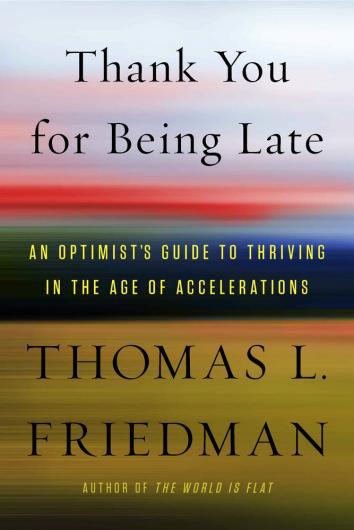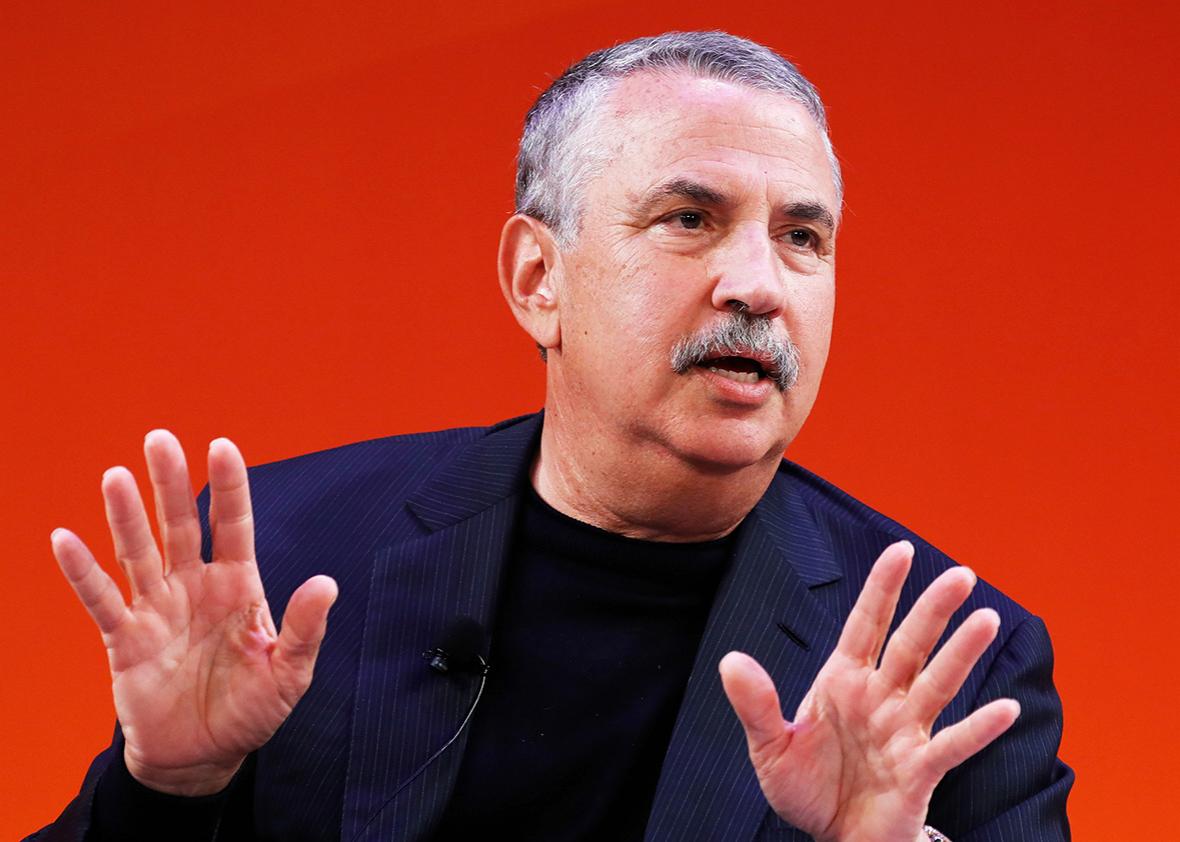Thomas Friedman is a sentient TED talk who writes credulous columns about taxi drivers and ideas conferences for the New York Times. He also writes books, very successful ones, and from them I have learned a lot about the shape and temperature of the world. I have also learned a lot about Friedman himself: his love for anecdotal futurism, his abiding faith in thought leaders, his oracular pretensions. I find his work sycophantic, but I do not blame him for it. Dissenters do not get invited to Davos.
His latest book came out in November. It is called Thank You for Being Late, and it is, as many of Friedman’s books have been, a blockbuster. (It’s currently in its seventh week on the New York Times best-seller list.) In it, Friedman speaks to dozens of the consultants, technologists, and entrepreneurs who have remade our world and who have made you expendable in the bargain. The book is framed as “an optimist’s guide to thriving and building resilience in this age of accelerations,” in which technology, globalization, and climate change are advancing at speeds that our feeble human brains can barely comprehend. What to do? Echoing the great management consultants REO Speedwagon, Friedman argues that the best response is to roll with the changes.
Rather than resist or try to regulate technology and globalization, Friedman argues, we should remake our institutions in the image of the cloud. “[T]his isn’t complicated: the most educated people who plug into the most flows and enjoy the best governance and infrastructure win,” he writes, and the best governance, to him, is governance that fosters disruptive innovation. Labor unions, government regulation, progressive populism, idle pleasures, and the consolations of philosophy: All of these just serve to impede flow and inhibit the sort of entrepreneurial ferment that brought us WeChat and Periscope.
That’s the message of Thank You for Being Late. Friedman takes almost 500 pages to deliver it. He says lots of other stuff, too, like “Mother Nature believes in lifelong learning,” and “By leveraging the supernova you can do so much more now with so little,” and “For my money, naïveté is the new realism.” What, exactly, does that mean? I didn’t know, either. I had to read it again, which became my habit as I worked through all the whole thing. The world might be fast, but this particular book went by very, very slow.

Amazon
“I went into journalism because I love being a translator from English to English,” he asserts in his opening paragraph, and interpreted literally what he is saying is that he enjoys doing work that is wholly unnecessary. That’s not what Friedman means, of course: He means that he likes to distill complicated concepts. He is good at this. I enjoyed the part of the book where Friedman explained how a microchip works; likewise, the section where he described how the effects of climate change have politically destabilized parts of Africa and the Middle East.
But too often in Thank You for Being Late, as is Friedman’s wont, distillation becomes oversimplication. “Monterrey has tens of thousands of poor living in shantytowns. They’ve been there for decades,” he writes at one point. Wow, sounds tragic. But don’t worry, friends: “What is new, though, is that it now also has a critical mass of young, confident innovators trying to solve Mexico’s problems, by leveraging technology and globalization.” This is a man who has won Pulitzer Prizes for his foreign correspondence; a man who dearly wants you to know how many countries he has visited. He cannot actually believe that Mexican poverty will be fixed by an app.
Or maybe he does? Friedman takes a lot of things at face value. He spends 100 pages furiously stanning for polarizing companies such as Uber and Airbnb. He earnestly recounts his conversation with a “business visualization” expert: “When we first talked on the phone, he illustrated our conversation real-time on a shared digital whiteboard. I was awed.” He raves about “smart” appliances with the wide-eyed optimism of a man who perhaps has never used one. “There was a time when you might have referred to someone as ‘dumb as a fire hydrant’ or ‘dumb as a garbage can,’ ” he writes. First of all, no one says this, as a Google Books search for these two epithets goes to show. Moreover, the “smart” garbage can—the Bigbelly can found on some New York City streets—that he goes on to praise is a really terrible can that no one likes, because you have to grab the can’s gross handle in order to use it. This “smart” garbage can is seriously the worst. I’d rather litter.
Friedman writes in a voice that is simultaneously folksy and ostentatious. He has always written this way, to an extent, but it somehow seems worse than before in Thank You for Being Late, as if his style is devolving, as if he has reached such complacent professional heights that his prose is now cranked out by a Tom Friedman–sentence generator. He has gone kicker crazy in this book. The book is larded with incongruously punchy asides: at the end of chapters, at the beginning of chapters, randomly in the middle of chapters. “No, no, no: This ain’t no soft, fluffy cloud,” he writes as a lead-in to a chapter on cloud computing. He reminds me of someone who speaks in brand names; someone who asks you to “please pass the Heinz brand ketchup” before dumping it all over his eggs. On Page 3, for example, he mentions Johannes Gutenberg, who introduced movable type to Europe in the 15th century—except he calls him “Johannes Gensfleich zur Laden zum Gutenberg.” Why did he do this? Was he afraid you would confuse him with some other Johannes Gutenberg? Was he simply cutting and pasting from Gutenberg’s Wikipedia entry? More annoying is that he mentions Gutenberg only to make a lame point about how ours might be the most disruptive era since the invention of movable type. Everyone always thinks they’re living in the most disruptive era since movable type. Thought leaders in the William McKinley administration were saying the same thing about the gramophone.
I found this book facile, is what I’m trying to say, facile and corny. “[In 2004,] Big Data was a good name for a rap star,” he writes early on, and while that’s not a great joke, at least it’s clearly a joke. More often, Friedman’s punchlines get completely lost in his translations from English to English. “Attention, Kmart shoppers: this is not your grandma’s Ma Bell!” he says at another point—italics his, for some reason—and I could not help but take this literally and imagine him barging into the Penn Station Kmart and commandeering the PA system to broadcast this hot take to a bunch of alarmed patrons who do not know why Dr. Phil is yelling at them. The book reaches peak corniness with this gem: “Also, never forget that the best-selling book of all time is a collection of stories about people. It’s called the Bible.”
Thank You for Being Late is also a collection of stories about people, mostly of the thought-leading variety. Friedman believes everything he hears from technologists, and these are practically the only people to whom he speaks. The book is suffused with their contempt for the non–thought leading segments of the public. This contempt is subtextual, mostly, but it’s there nevertheless. I believe that their oracular rhetoric is cover for their real ambitions: to roll back progressive reforms, to neuter organized labor, and to make you a slave to your job right up until the moment when your job is eliminated.
Thank You for Being Late offers invaluable, if perhaps inadvertent, insight into the technologists’ cold monomania. It’s there in the words of David Marcus, a Facebook executive, who hopes to “make phone numbers obsolete,” to be replaced by Facebook Messenger. (“Imagine what that will do to intensify the flow of flows,” cheers Friedman.) It’s there when we hear from Bill Ruh, chief digital officer at General Electric, who speaks of a time when novice workers will use smart machines to “overnight become like a thirty-year veteran,” leaving you, the reader, to imagine what might then happen to that displaced thirty-year veteran. Let’s not forget Eric Teller, the grandson of the architect of the hydrogen bomb; he is a Google executive who “arrived at our interview on Rollerblades, which is how he keeps up with his daily crush of meetings.” (Just like Saul of Tarsus!)
I think it’s safe to say we all hope that Rollerblade Guy crashes. Or maybe not! Maybe you’re charmed and inspired by his theatrical efficiency. Maybe you agree with the thought leaders’ technological determinism, with their view of progress as a purely quantitative metric. Someone has to enjoy this stuff, after all. Of course, Thomas Friedman will always sell books because he’s Thomas Friedman, the bard of the C-suite, a brand unto himself, a reliable corporate read. Buying this book is a hell of a lot cheaper than hiring McKinsey.
A very perceptive barfly once explained it to me like this. In the corporate world, you’ve got A players, B players, and C players stacked top to bottom like a pyramid. There’s this documentary called Jiro Dreams of Sushi, about a perfectionist Japanese sushi chef. When an A player sees that movie, the barfly explained, she will come to work the next day determined to work harder and smarter than ever before. A B player will spend the next day raving about the movie to anyone who’ll listen; maybe she’ll write a review for her blog. A C player sees Jiro Dreams of Sushi and comes to work the next day inspired to order Japanese food for lunch.
Tom Friedman is a B player interpreting A players for the benefit of C players, and there are lots of C players, and maybe it’s that simple. But both B players and C players habitually miss the point—and, in the end, so does Thank You for Being Late. Because, starting this week, the federal government will be in the hands of the D players, people who respond to Jiro Dreams of Sushi by complaining that people like Jiro are stealing their jobs. And a truly prescient commentator would have seen this coming.
Thomas Friedman did not. Thank You for Being Late was put to bed well before the presidential election, and throughout the text Friedman makes occasional dismissive references to Donald Trump and Bernie Sanders. (Ha ha, remember those clowns? Good thing technocratic rationality prevailed!) Near the end of the book, Friedman presents an earnest 18-point plan for governmental reform in the age of accelerations; a platform for the “Making the Future Work for Everybody” party, as he puts it. Thomas Friedman doesn’t know a damn thing about the future. Despite all of his self-serving rhetoric about necessities and inevitabilities, he still couldn’t recognize that Trumpism is in part a consequence of thought leadership, of rampant globalization with blithe disregard for its domestic casualties, of having your head jammed so far up the future’s ass that you’ve completely lost touch with the present.
As for Friedman himself, he is who we always knew he was: a diligent neoliberal stenographer; a cheerleader for billion-dollar corporations; a leading exponent of a brand of bigfoot journalism that deigns to mention ordinary people only insofar as their lives offer anecdotal support for some broader thesis. His book will continue to sell even though the author paraphrases old columns without making clear that that’s what he’s doing, even though at one point he spends an entire page blockquoting a transcript of someone else’s TED talk. He is an optimist insofar as he is sure that he will certainly thrive at any speed.
–
Thank You for Being Late by Thomas Friedman. Farrar, Straus, and Giroux.
